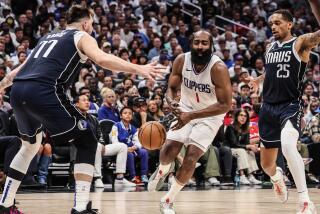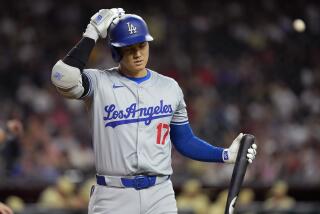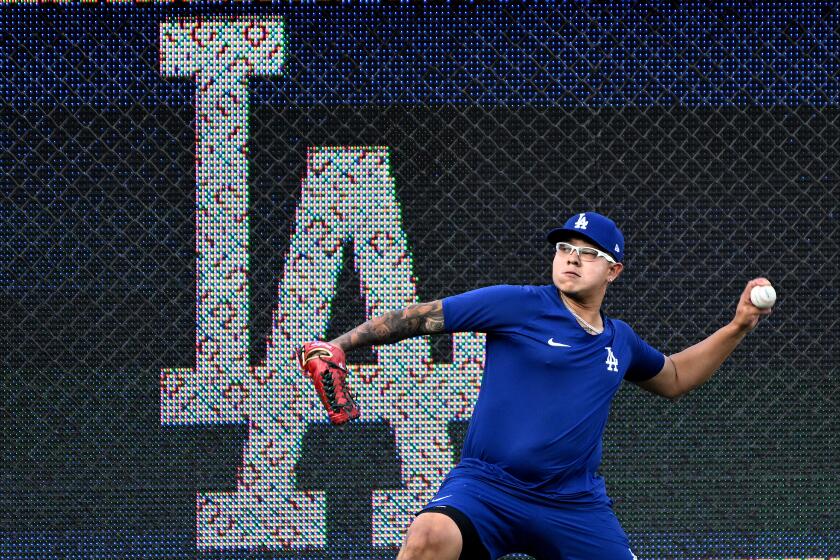Tennis : Williamses Changing Attitudes On and Off the Tennis Court
The tennis world has this dilemma. It is called the Williams family.
The tennis world knows that it needs this dilemma, because with the Williams family comes drama bordering on melodrama, and that sells everywhere from Esquire to the back page of the New York Post.
Lord knows, the tennis world needs exposure both places.
The tennis world also knows that, melodrama notwithstanding, it also gets great tennis from the daughters of Richard and Oracene, daughters who are currently the Nos. 3 and 6 players in the world. Nineteen-year old Venus is No. 3, 17-year-old Serena No. 6.
Almost from the moment the Williams family burst on the scene a few years ago, reaching a peak of attention when Venus got all the way to the U.S. Open final in 1997, tennis didn’t quite know what to make of them.
It wasn’t that they were black. This is a sport that, while its evolution has been mostly on the courts of white country clubs, has had wonderful black champions such as Althea Gibson and Arthur Ashe and has named its most important facility for the most important event it plays in its most important country after Ashe.
And it wasn’t that they were too good, because tennis, like any other major sport, realizes the need to constantly replenish the talent.
The dilemma centered more on attitude, on a kind of a we-are-here-so-stand-aside approach to doing things. Father Richard’s dealings with the media ran the gamut of charming to chip-on-the-shoulder. And in the early years, Venus and Serena handled their public dealings with a similar sort of wink-and-sneer gamesmanship.
Were tennis to be the NBA or the NFL, everybody would have nodded and understood. Trash-talking and chest-thumping plays well there, where the fan base is a bit less hung up on appearances, a bit less genteel.
Tennis, which somehow was able to look the other way while Jimmy Connors went on some of his boorish runs and John McEnroe acted like the pits of the world, remains most comfortable with its No. 1 players being Chris Evert and Stefan Edberg. Or Evonne Goolagong and Ashe.
So Venus and Serena Williams, and to a greater degree Richard, were an acquired taste. Tennis is still acquiring.
But that’s a big difference. It is trying. More often than not these days, it is even succeeding.
When Richard told a reporter earlier in the tournament that the final would have Venus versus Serena, a statement that normally would have been treated as one of great audacity was taken in the context of Richard being Richard, having some fun. Also, it was taken as a reasonable prognostication, since that is exactly what the final was earlier this year in the important Lipton tournament in Key Biscayne, Fla.
This is the same Richard Williams who, along the way, has called one of Venus’ opponents, Irina Spirlea of Romania, “a big white turkey”--he later apologized; has suggested they move the U.S. Open from New York City to Compton, and delighted in telling a television reporter in Manhattan Beach a few years ago that he hoped Serena would win her match because she would play Martina Hingis next and “kick her . . .”
Mary Carillo, network tennis broadcaster, once said that Richard “created messes for his teen-age daughters to clean up.”
Now, more and more, the emphasis has shifted from off the court to on the court. And there, the Williams sisters have been marvelous.
Saturday, playing against a gifted and inspired 16-year-old from Belgium, Serena persevered and won a three-set match that had all the ingredients of one she would have lost six months ago. Kim Clijsters actually served for the match at 5-3 of the third set, yet Serena didn’t just hang on, but finished firing bullets.
Sunday, Venus faced a challenge of a different kind. She got out-thought by a veteran, Mary Joe Fernandez, and lost a quick, 27-minute first set, 6-2.
Fernandez, at 28 in her 14th year on the women’s tour, made Venus look nearly helpless by taking most of the pace off the ball and by pounding Venus’ weaker side, the forehand. Fernandez, playing with a delicate touch and slow-balling Venus with a serve that only once topped the 90-mph mark, was positioned for the upset of the tournament.
But then Fernandez took a hard fall just before both were sent off for a rain delay--Fernandez said later that she didn’t think the injured thigh that resulted had a major effect on the outcome--and Venus Williams came out, adjusted her game and blasted the veteran off the court in a 6-1, 6-0 finish that took just 58 minutes.
When Fernandez fell just as rain started falling in the middle of a long rally, she ended up on her back on the baseline, grasping her right leg. Williams immediately walked around the net to the far end of the court to check on Fernandez.
“She was cute,” Fernandez said. “She calls me Mary, not Mary Joe. She said, ‘I’m sorry, Mary. Are you OK, Mary?’ It was really nice of her to come and check up on me.”
Little gestures like that go a long way with tennis fans. There may come a day in the very near future when Venus and Serena will be all about what happens on the tennis courts.
Same for Richard?
Well, that may take a bit longer. Nobody in the sport has yet to call him “cute.”
More to Read
Get our high school sports newsletter
Prep Rally is devoted to the SoCal high school sports experience, bringing you scores, stories and a behind-the-scenes look at what makes prep sports so popular.
You may occasionally receive promotional content from the Los Angeles Times.







